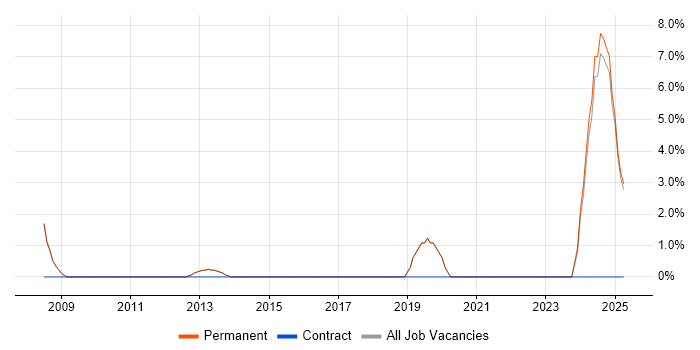Budgeting and Forecasting
Staffordshire > Cannock
The table below provides summary statistics for permanent job vacancies advertised in Cannock requiring Budgeting and Forecasting skills. It includes a benchmarking guide to the annual salaries offered in vacancies that cited Budgeting and Forecasting over the 6 months leading up to 5 May 2025, comparing them to the same period in the previous two years.
| 6 months to 5 May 2025 |
Same period 2024 | Same period 2023 | |
|---|---|---|---|
| Rank | 8 | - | - |
| Rank change year-on-year | - | - | - |
| Permanent jobs citing Budgeting and Forecasting | 3 | 0 | 0 |
| As % of all permanent jobs advertised in Cannock | 5.77% | - | - |
| As % of the Processes & Methodologies category | 15.79% | - | - |
| Number of salaries quoted | 0 | 0 | 0 |
| Median annual salary (50th Percentile) | - | - | - |
| Staffordshire median annual salary | £65,000 | £62,500 | £43,750 |
| % change year-on-year | +4.00% | +42.86% | - |
All Process and Methodology Skills
Cannock
Budgeting and Forecasting falls under the Processes and Methodologies category. For comparison with the information above, the following table provides summary statistics for all permanent job vacancies requiring process or methodology skills in Cannock.
| Permanent vacancies with a requirement for process or methodology skills | 19 | 95 | 12 |
| As % of all permanent jobs advertised in Cannock | 36.54% | 100.00% | 66.67% |
| Number of salaries quoted | 4 | 34 | 7 |
| 10th Percentile | £41,650 | £22,250 | £26,150 |
| 25th Percentile | £48,625 | £27,125 | £28,426 |
| Median annual salary (50th Percentile) | £60,000 | £37,500 | £32,403 |
| Median % change year-on-year | +60.00% | +15.73% | -27.99% |
| 75th Percentile | £71,875 | £52,188 | £51,804 |
| 90th Percentile | £79,750 | £57,100 | £59,500 |
| Staffordshire median annual salary | £42,500 | £40,000 | £45,000 |
| % change year-on-year | +6.25% | -11.11% | - |
Budgeting and Forecasting
Job Vacancy Trend in Cannock
Job postings citing Budgeting and Forecasting as a proportion of all IT jobs advertised in Cannock.

Budgeting and Forecasting
Co-occurring Skills and Capabilities in Cannock by Category
The follow tables expand on the table above by listing co-occurrences grouped by category. The same employment type, locality and period is covered with up to 20 co-occurrences shown in each of the following categories:
